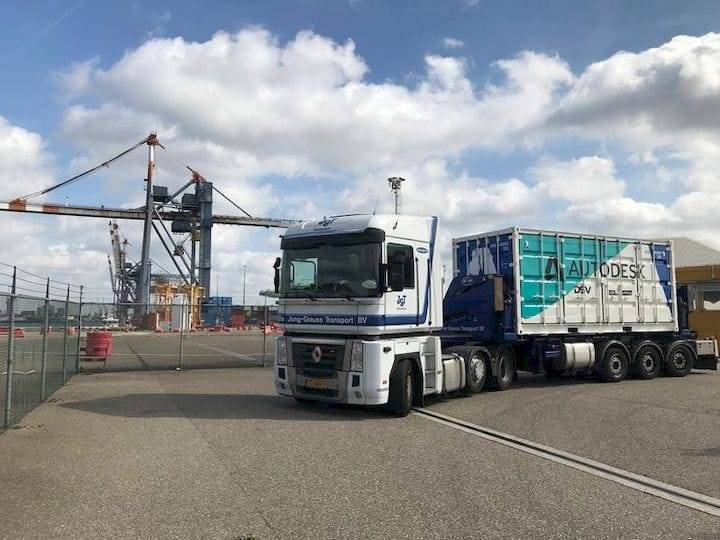[ihc-hide-content ihc_mb_type=”show” ihc_mb_who=”reg” ihc_mb_template=”3″ ]
[vc_row][vc_column][vc_column_text]Credit – www.fabbaloo.com
The ZDNet story is not flush with details, so we have to do a little bit of interpretation here. We see in the image above there is a small trailer system housing the equipment, which is imaged below.[/vc_column_text][vc_single_image image=”4138″ img_size=”full” add_caption=”yes”][vc_column_text]It appears to be a dual-armed robotic system that uses a rotating platform. The platform itself seems to be missing, but there are a number of bolt holes there to hold a build plate. It appears that the Autodesk system is a metal powder jetting device, where metal particles are melted upon exit from the nozzle. They then adhere to a gradually built-up object’s surface on the build plate.
The reports says:
“The idea is that various robots and printing systems — capable of printing large, usable metal components — can be packaged up in a shipping container and sent from job site to job site. This method, the company says, enables buildings to be built quickly, parts to be produced more accurately, and helps to fill the construction labor shortage.”
So it seems they have developed a metal 3D printer for building sites, and are using it as a demonstration concept.
This is an approach the company has used previously. In 2015 the company began selling a SLA 3D printer, the Ember. This machine emerged before the majority of inexpensive SLA 3D printers hit the market, but was used by Autodesk mainly as a vehicle to develop standards and generally explore the 3D printing space. It was not really for commercial purposes in and of itself, and ultimately was dropped as a product after its goals were achieved.
Could Autodesk be doing something similar here? With the growing interest in construction 3D printing, it might not be a surprise if so.
Autodesk could surely provide significant benefit to the space, as there are really no standards or best practices yet evolved. Even the technology itself is not stabilized, with multiple vendors exploring different approaches.
The worst part of the construction 3D printing equation currently is the dramatic lack of appropriate software that could properly drive the technology forward. Today the few 3D printed construction projects tend to have rather conventional designs that really don’t take full advantage of the 3D printing technologies involved.
That’s what made 3D printing good for manufacturing: the ability to do DIFFERENT things. That’s what has to happen in construction 3D printing, yet no software allows this to happen.
I am therefore quite excited that Autodesk has taken interest in this space, as it may cause them to at least modify some of their 3D design products to account for 3D printed construction techniques, if not create an entirely new 3D design product specifically for construction 3D printing.
However, I am a bit puzzled by their choice of a metal 3D printer for this explorations, as opposed to a concrete 3D printer. But one can recall their introduction of a resin 3D printer in a world filled with desktop thermoplastic printers years ago and think: maybe they know something we don’t?[/vc_column_text][/vc_column][/vc_row]
[/ihc-hide-content]


